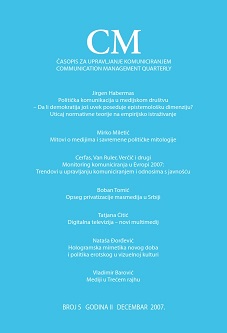Opseg privatizacije masmedija u Srbiji
Range of Privatisation of Mass Media in Serbia
Author(s): Boban TomićSubject(s): Media studies, Management and complex organizations, Economic development, Corruption - Transparency - Anti-Corruption
Published by: Fakultet političkih nauka Univerziteta u Beogradu
Keywords: mass media; privatisation; models; Serbia;
Summary/Abstract: Privatisation of the mass media in Serbia is a part of a large-scale privatisation of public and state property in companies. It has been carried out since 2001 as a part of transitional processes with an aim to adapt social and economic atmosphere in the country to European surroundings and modern practice in the world. Privatisation regulations were issued during 2001, but the first results were not satisfactory. Although spirit of the law requires privatisation to become a means to improve the mass media activities and profession, it rarely happens in practice. The first examples of privatisation were marked by manipulations and misuses, which endangers the existence of the mass media activities. The most common motivation for acquisition of the mass media companies is their material value, but not the intention to develop informative, educational and entertaining function of the mass media. It increases the danger for majority of the mass media to be closed down, which could negatively affect the whole social process. The most important problem is the fact that representatives of employees, i.e. journalists and editors, do not take part in the process of privatisation, which could be highly beneficial, since they are, because of numerous specific qualities, particularly interested in successful reforming of the mass media. Considering the fact that privatisation of majority of the public and state mass media companies has not been finished yet, it is necessary to issue new regulations and a new model of the mass media ownership transformation. Accordingly, the optimal model, which includes both employees and founders of the mass media in the process of ownership transformation, is suggested. The main point is to transfer the activity from the state to the local community and employees and founders so that financial effects could be positive for all the sides included. This model complies with modern regulations in Europe and it satisfies all interested social factors. It could improve operating conditions of the mass media, fully contribute to the social and economic development of the country as well as democratisation of the society.
Journal: CM Komunikacija i mediji
- Issue Year: 2/2007
- Issue No: 5
- Page Range: 55-76
- Page Count: 22
- Language: Serbian

